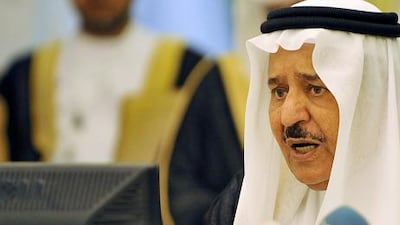RIYADH // The heir to the Saudi throne who cemented his reputation by crushing Al Qaeda in the kingdom after the 9/11 attacks has died in Switzerland.
Crown Prince Nayef bin Abdulaziz Al Saud, who was thought to be 78, had been receiving medical treatment in Geneva since May.
Interior minister since 1975, he was appointed crown prince in November after the death of his elder brother, Crown Prince Sultan. The burial will take place in Mecca today.
Sheikh Khalifa, President of the UAE, and Sheikh Mohammed bin Rashid, Vice President and Prime Minister and Ruler of Dubai, were among those who sent messages of condolence yesterday to King Abdullah.
The crown prince’s death unexpectedly reopens the question of succession for the second time in less than a year. King Abdullah, 88, has now outlived two designated successors. A new crown prince will be chosen from among his brothers and half-brothers, all the sons of Saudi Arabia’s founder, Abdulaziz.
The figure believed most likely to be the new heir is Prince Salman, the defence minister who for decades occupied the powerful post of governor of Riyadh. The crown prince will be chosen by the Allegiance Council, an assembly of Abdulaziz’s sons and some of his grandchildren.
Crown Prince Nayef had a reputation for being a hard-liner and a conservative. He was believed to be closer than many of his brothers to the powerful Wahhabi religious establishment, and he at times worked to give a more free hand to the religious police.
His elevation to crown prince had raised worries among liberals in the kingdom that, if he became king, he would halt or even roll back reforms that King Abdullah had enacted. He had expressed some reservations about some of the reforms, which made incremental steps to increase democracy and women’s rights.
Nayef said he saw no need for elections or for women to sit on the Shura Council, the advisory body to the king.
His main concern was security in the kingdom and maintaining a bulwark against Iran, according to US Embassy assessments. “A firm authoritarian at heart,” was the description in a 2009 embassy report.
The crown prince built up his power in the kingdom though his fierce crackdown on Al Qaeda and a broader campaign to prevent the growth of Islamist militancy among Saudis.
In mid-2003, Islamist militants struck inside the kingdom, targeting three residential expatriate compounds – the first of a string of assaults that later hit government buildings, the US consulate in Jeddah and the perimeter of the world’s largest oil processing facility in Abqaiq. Al Qaeda branch in the country announced its aim to overthrow Al Saud royal family.
The attacks galvanised the government into serious action against the militants, an effort spearheaded by Nayef. Over the next years, dozens of attacks were foiled and hundreds of militants were rounded up and killed.
By 2008, it was believed Al Qaeda’s branch in the country was largely broken. Militant leaders who survived or were not jailed largely fled to Yemen, where they joined Yemeni militants in reviving Al Qaeda in the Arabian Peninsula.
Nayef took a leading role in fighting the branch in Yemen as well. In 2009, militants tried to assassinate his son, Prince Mohammed, who is deputy interior minister and the commander of counterterrorism operations: a suicide bomber posing as a repentant militant blew himself up in the same room as the prince but failed to kill him.
The anti-militant campaign boosted Nayef’s ties to the religious establishment, which he saw as a major tool in keeping stability and preventing the spread of violent jihadi theology. The Wahhabi ideology that is the official law in Saudi Arabia includes strict segregation of the sexes, capital punishment such as beheadings and enforced prayer time, and is also firmly opposed to Al Qaeda’s calls for holy war against leaders seen as infidels.
Nayef’s interior ministry allied with imams in a rehabilitation programme for detained militants, who went through intensive courses in “correct” Islam to sway them away from violence. The programme brought praise from the United States.
Nayef never clashed with King Abdullah over reforms or made attempts to stop them – such a step would be unthinkable in the tight-knit royal family, whose members work hard to keep differences under wraps and ultimately defer to the king. But Nayef was long seen as more favourable to the Wahhabi establishment. In 2009, he shut down a film festival in Jeddah, apparently because of worries about the possibility of gender mixing in cinemas and a general distaste toward film as immoral.
Nayef, a soft-spoken, stocky man of medium build, was born in 1933, the 23rd son of Abdulaziz, the family patriarch who founded the kingdom in 1932 and had dozens of sons. Nayef was one of the five surviving members of the Sudairi seven, sons of Abdulaziz from his wife Hussa bint Ahmad Sudairi who, for decades, have held influential posts. He was a half-brother of King Abdullah.
Before being appointed interior minister, he held the posts of Riyadh governor, deputy minister of interior and minister of state for internal affairs. He had 10 children.
* The Associated Press, with additional reporting by Wam

